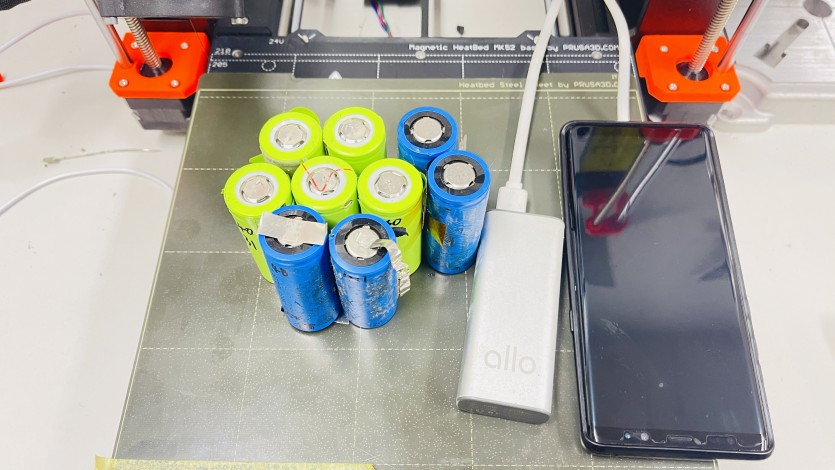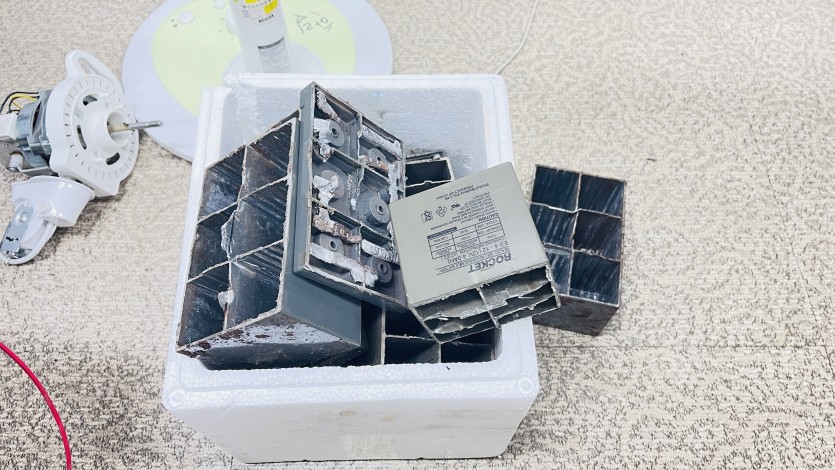Experiencer on Recycling Lithium-Ion Batteries
페이지 정보

본문
Lithium-ion batteries, commonly used in devices like cordless vacuum cleaners, power banks, and smartphones, are an indispensable part of modern life. However, when they reach the end of their lifespan, they are often discarded, leading to significant environmental pollution and high carbon emissions. To address this issue, I undertook a project to recycle discarded lithium-ion batteries and repurpose them into a battery pack that could be used as a power bank for everyday applications. This experience highlighted the environmental and practical benefits of battery recycling.
1. The Problem with Discarded Lithium-Ion Batteries
Lithium-ion batteries are widely favored for their high performance and lightweight properties, making them ideal for portable electronics. However, improper disposal of these batteries can release harmful substances into the environment, while the recycling process itself can be costly and carbon-intensive. The production of new batteries requires substantial resources and energy, contributing significantly to carbon emissions. Recycling lithium-ion batteries not only reduces waste but also addresses these environmental challenges, making it a crucial step toward sustainability.
2. The Recycling Process
The process began with collecting used lithium-ion batteries from devices like cordless vacuum cleaners and old power banks. I tested the batteries to identify cells in good condition, checking their voltage and capacity to ensure they were safe and functional. After selecting usable cells, I assembled them into a new battery pack, incorporating a Battery Management System (BMS) to balance the voltage and enhance safety. This system ensures the pack operates efficiently and prevents overcharging or overheating.
3. Practical Applications of the Recycled Battery Pack
The recycled battery pack I created had a capacity of approximately 200Wh and was converted into a power bank that proved incredibly versatile in daily life. I used it to charge smartphones, power a desk lamp, operate a hair dryer, and even run decorative mood lighting. The pack was particularly useful during outdoor activities like camping, providing reliable power for various devices. This experience demonstrated how recycled resources could be transformed into functional, everyday solutions that promote convenience and sustainability.
4. Carbon Reduction and Environmental Benefits
One of the most significant advantages of recycling lithium-ion batteries is its contribution to reducing carbon emissions. The disposal process of lithium-ion batteries typically releases a substantial amount of carbon, but recycling helps mitigate this impact. Additionally, by repurposing old batteries, the demand for new battery production is reduced, saving valuable resources and energy. Research indicates that recycling a single lithium-ion battery can prevent the release of approximately 25kg of carbon dioxide. My battery pack, constructed with 10 cells, achieved an estimated reduction of 250kg of carbon emissions. This impact is equivalent to planting trees and has significant positive implications for the environment.
5. Insights and Reflections
Through this project, I gained a deeper understanding of the importance of recycling and its role in combating climate change. The realization that discarded lithium-ion batteries can be repurposed into functional products was both surprising and inspiring. It showed me that small individual actions, when multiplied, can create a significant environmental impact. If more people adopt and practice these recycling methods, we can move closer to a sustainable future.
Conclusion
Recycling lithium-ion batteries goes beyond reducing waste—it plays a vital role in cutting carbon emissions and addressing climate change. The repurposed battery pack not only provided practical energy solutions for daily life but also underscored the potential of recycled materials to create value. This experience has motivated me to continue these efforts and to encourage others to join in promoting environmental sustainability.
1. The Problem with Discarded Lithium-Ion Batteries
Lithium-ion batteries are widely favored for their high performance and lightweight properties, making them ideal for portable electronics. However, improper disposal of these batteries can release harmful substances into the environment, while the recycling process itself can be costly and carbon-intensive. The production of new batteries requires substantial resources and energy, contributing significantly to carbon emissions. Recycling lithium-ion batteries not only reduces waste but also addresses these environmental challenges, making it a crucial step toward sustainability.
2. The Recycling Process
The process began with collecting used lithium-ion batteries from devices like cordless vacuum cleaners and old power banks. I tested the batteries to identify cells in good condition, checking their voltage and capacity to ensure they were safe and functional. After selecting usable cells, I assembled them into a new battery pack, incorporating a Battery Management System (BMS) to balance the voltage and enhance safety. This system ensures the pack operates efficiently and prevents overcharging or overheating.
3. Practical Applications of the Recycled Battery Pack
The recycled battery pack I created had a capacity of approximately 200Wh and was converted into a power bank that proved incredibly versatile in daily life. I used it to charge smartphones, power a desk lamp, operate a hair dryer, and even run decorative mood lighting. The pack was particularly useful during outdoor activities like camping, providing reliable power for various devices. This experience demonstrated how recycled resources could be transformed into functional, everyday solutions that promote convenience and sustainability.
4. Carbon Reduction and Environmental Benefits
One of the most significant advantages of recycling lithium-ion batteries is its contribution to reducing carbon emissions. The disposal process of lithium-ion batteries typically releases a substantial amount of carbon, but recycling helps mitigate this impact. Additionally, by repurposing old batteries, the demand for new battery production is reduced, saving valuable resources and energy. Research indicates that recycling a single lithium-ion battery can prevent the release of approximately 25kg of carbon dioxide. My battery pack, constructed with 10 cells, achieved an estimated reduction of 250kg of carbon emissions. This impact is equivalent to planting trees and has significant positive implications for the environment.
5. Insights and Reflections
Through this project, I gained a deeper understanding of the importance of recycling and its role in combating climate change. The realization that discarded lithium-ion batteries can be repurposed into functional products was both surprising and inspiring. It showed me that small individual actions, when multiplied, can create a significant environmental impact. If more people adopt and practice these recycling methods, we can move closer to a sustainable future.
Conclusion
Recycling lithium-ion batteries goes beyond reducing waste—it plays a vital role in cutting carbon emissions and addressing climate change. The repurposed battery pack not only provided practical energy solutions for daily life but also underscored the potential of recycled materials to create value. This experience has motivated me to continue these efforts and to encourage others to join in promoting environmental sustainability.
- PrevEnvironmental Conservation: A Cultural Comparison of South Korea and Bangladesh 24.12.05
- NextHaving acne 24.11.30
댓글목록
There are no registered comments.


